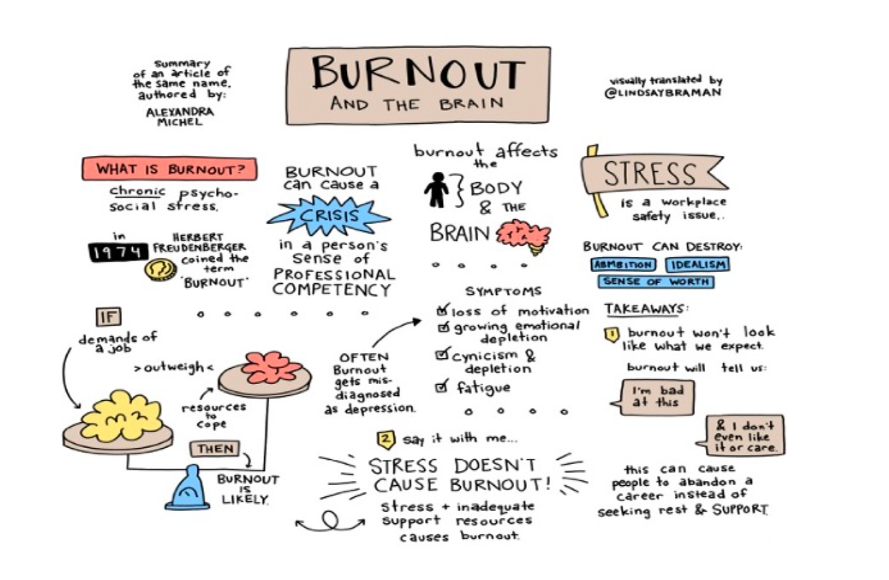ASK MERLY: I HAVE BURNOUT. HELP.
Welcome to The Countertalk Problem Page, where founder of Me, Myself in Mind and stress reduction coach Merly Kammerling answers your questions.
Q:
“I’ve been working over 60 hours a week for the last few months because we are so short staffed; I am exhausted and constantly thinking about work. I used to have so much enthusiasm and energy, but now I feel like an empty shell of myself. I’m so disconnected from everything, not just work but also my mates and my long-term girlfriend. I don’t know this person I’ve become and just feel trapped, like I am failing at life. Do you have any suggestions of what could help me get out of this spiral?”
I am sorry to hear that you are feeling like you’re in this spiral, it’s such a horrible place to be in life. I can definitely relate to you, having gone through similar experiences dealing with unhealthy relationships to previous jobs, and now working clients that report the same experiences and symptoms.
What you are describing, along with the number of hours you report you’ve been working these last months, are tell-tale signs of burnout. The concept has turned into quite the buzzword in our industry over the past few years, a perception which can unfortunately depreciate the concept. But it is still very much a real thing, and very different to being stressed. There is a similar struggle of coping with pressures, but when burnout takes hold, your battery is completely zapped of your resources and you can often feel utterly overwhelmed and hopeless.

Here are some key differences:
Stress:
- You put in too much effort
- You feel emotions strongly
- You have less energy
- It takes a physical toll
Burnout:
- It’s hard to put in any effort
- Emotions feel blunted and you feel numb
- You have less motivation
- It takes an emotional toll
And here are some core symptoms of burnout:
- Feeling tired or drained most of the time
- Feeling helpless, trapped and/or defeated
- Feeling detached/alone in the world
- Exhibiting a cynical/negative outlook
- Self-doubt
- Procrastinating and taking longer to get things done
- Feeling overwhelmed
This doodle from therapist and illustrator Lindsay Braman describes occupational burnout brilliantly in a visual and digestible way…

A key aspect of burnout is increased feelings of emotional exhaustion. As emotional resources become depleted, a person can feel that they are no longer able to give themselves at a psychological or emotional level and this can impact performance, our ability to cope and our relationships with others.
Something to be mindful of is that burnout can appear as a pattern of behaviours towards certain relationships in our lives; work being one of those relationships. The list below provides an explanation of the causes of occupational burnout, and the red flags to be aware of going forward:
- Extreme levels of energy exerted. When a job is super-demanding, repetitive or chaotic, and you need constant energy to remain focused but lack the necessary rest to recharge, this can lead to fatigue and job burnout.
- Work life imbalance. When work takes up so much of your time and effort that you don’t have the energy to spend time doing the things that give you the headspace to relax, impacting your overall wellbeing.
- Lack of control and resources in your workplace. A clear link has been found between a lack of control and burnout. If you are unable to influence certain significant parts of your job — such as your rota or your workload – you might be on the track to burnout. A lack of the resources you need to get your work done can also lead to burnout.
- Unclear job expectations. If you’re not sure what’s expected of you within your role you may start to doubt your ability to achieve: that lack of clarity can seriously impact how we feel about our work and ourselves.
- Dysfunctional workplace dynamics. Feeling micromanaged, not supported enough, or even undermined can cause undue friction which can affect your ability to appropriately cope.
- Lack of social support. If you feel isolated at work and lack the time to connect with friends and loved ones in your personal life, your mental and emotional wellbeing will be severely impacted.
The good news is that burnout is totally reversible but does take deliberate action and effort to change, requiring thoughtful consideration and significant adjustments on your part. I would suggest discussing what’s happening to you with your manager to find out if they can work with you to change expectations or reach compromises on how your time is being spent. Here are some factors that are important to action:
- Eliminate the drains. Think about the things in your life that are draining your resources and have a negative impact on you. This could be certain people, commitments or consuming habits such as social media, unhealthy foods, stimulants, drugs or alcohol.
- Consider your options. Consider possible options that could change your current state of wellbeing. For example, if a sustainable and manageable workload is not possible in your current role then perhaps you need to decide whether your place of work is the right one. Think about what YOU want and what the best course of action is to get there.
- Sleep. Now, more than ever, you need the rest. Sleep restores well-being and helps protect your health.
- Seek support, you are not alone. Burnout is real and very common. Talk to people who can support you – colleagues, friends or loved ones – about what you are going through. If you have access to an employee assistance program or therapeutic services, now would be a good time to take advantage of them. You could also contact your GP and see what support and guidance they can suggest or provide in your area.
- Try relaxing activities. Explore activities that can help reduce stress such as mindfulness, yoga or something creative that will help you to take your mind off work.
- Exercise. Regular physical activity can help you better deal with stress. It can also take your mind off work and release those feel-good hormones to improve your mood.
Burnout is incredibly common. In 2019, ‘burnout’ was recognised by the World Health Organisation (WHO) as an ‘occupational phenomenon’ and some studies report that burnout has increased within the population since the pandemic.
Remember that there is nothing wrong with you, and that this state is a normal physiological reaction that occurs when we’ve pushed ourselves too far. With self-care, deliberate adjustments, and boundary-setting, it is very possible to heal from burnout.
